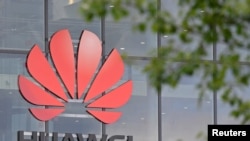The United States has effectively banned the Chinese company Huawei from building next-generation, or 5G, mobile communications networks in the country.
U.S. officials say Huawei will give information it collects to the Chinese government. They are warning other countries that the company is a national security risk.
U.S. officials have also put rules in place for American companies that export products to Huawei.
International technology companies are worried about the effects of these moves on the technology industry.
In Beijing, a Chinese Commerce Ministry official said,“China will take all necessary measures” to ensure the rights of Chinese companies. Spokesman Gao Feng the United States should avoid actions that may hurt trade talks with China.
The two countries are having a trade war that is partly about a struggle for international economic and technological power.
Reaction to US decision
Some observers say the actions of the Trump administration will likely worsen the already tense situation.
The export restriction puts the possibility “of continued trade negotiations into doubt,” said Eurasia Group experts in a report.
Huawei would be the largest business ever put under export controls. The new rules require Huawei to get U.S. government approval to buy American technology, said Kevin Wolf. He served as assistant secretary of commerce for export administration during the presidency of Barack Obama.
“It’s going to have…effects through the entire global telecommunications network because Huawei affiliates all over the (world) depend on U.S. content," Wolf said. He added that if Huawei and its business partners cannot get the computer software or equipment they need, their operations could collapse.
On Wednesday, U.S. President Donald Trump signed an order that bars American companies from using telecom equipment made by businesses said to be a national security risk.
The president’s executive order does not identify a country or company by name. But it follows months of U.S. complaints about Huawei.
U.S. justice and intelligence officials say China’s economic espionage and the stealing of trade secrets happen all the time. But they have not shown any evidence that any Huawei equipment in the U.S. or elsewhere has been compromised. Huawei denies involvement in Chinese spying.
Legal basis for executive order
The U.S. law used for the order is called the 1977 International Emergency Economic Powers Act. It has never before been used in a way that restricts an entire industry. It has been used mainly to seize the money of drug dealers, terrorists or collapsed corrupt governments.
Huawei is the world’s largest manufacturer of telecommunications equipment. The U.S. government believes that equipment from Chinese companies is a risk to U.S. internet and telecom networks.
For the past 10 years, American officials have warned that using Huawei technology is a national security risk. The company, they say, could use the equipment for espionage on behalf of China.
Huawei warns that preventing it from doing business in the United States would slow down the start of next-generation communications technology.
“We are ready and willing to (talk to) the U.S. government and come up with effective measures to ensure product security,” the company said in a statement.
The restrictions “will not make the U.S. more secure or stronger,” the company said. It said the United States would be limited to low quality, yet more costly, mobile systems.
In a statement, Federal Communications Commission Chairman Ajit Pai called the executive order a “step toward securing America’s networks.”
“It signals to U.S. friends and allies how far Washington is willing to go to block Huawei,” said Adam Segal. He is a cybersecurity director at the U.S. Council on Foreign Relations.
Huawei says it supplies 45 of the world’s top 50 telephone companies. But only about 2 percent of telecom equipment purchased by North American carriers was Huawei-made in 2017.
I’m Jonathan Evans.
The Reuters News Agency reported this story. Susan Shand adapted it for VOA Learning English. George Grow was the editor.
Write to us in the Comments Section or on our Facebook page.
______________________________________________________________
Words in this Story
doubt - n. to believe that something may not be true or is unlikely
global - adj. involving the entire world
affiliate - n. to closely connect with or to something such as a program or organization as a member or partner
content - n. the things that are in something
software - n. the programs that run on a computer and perform certain functions
complaint - n. the act of saying or writing that you are unhappy or dissatisfied with something
espionage - n. the things that are done to find out secrets from enemies or competitors








